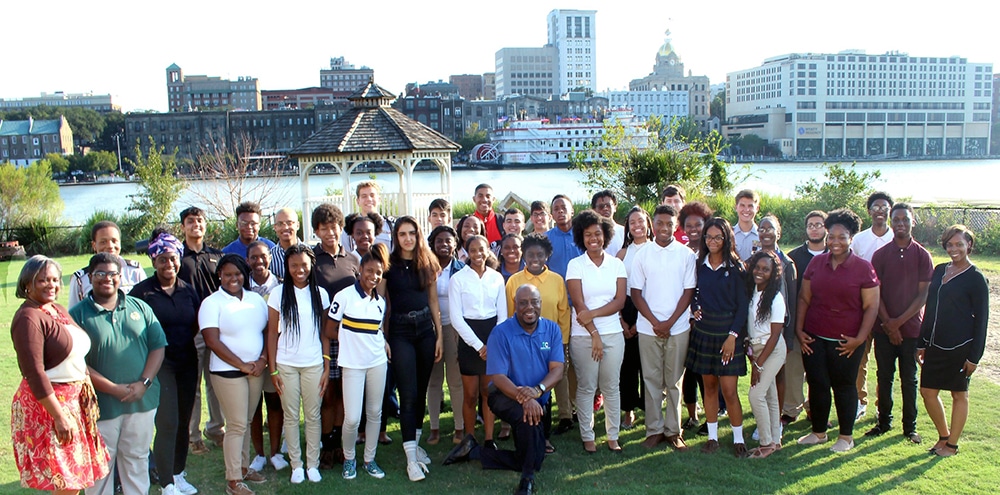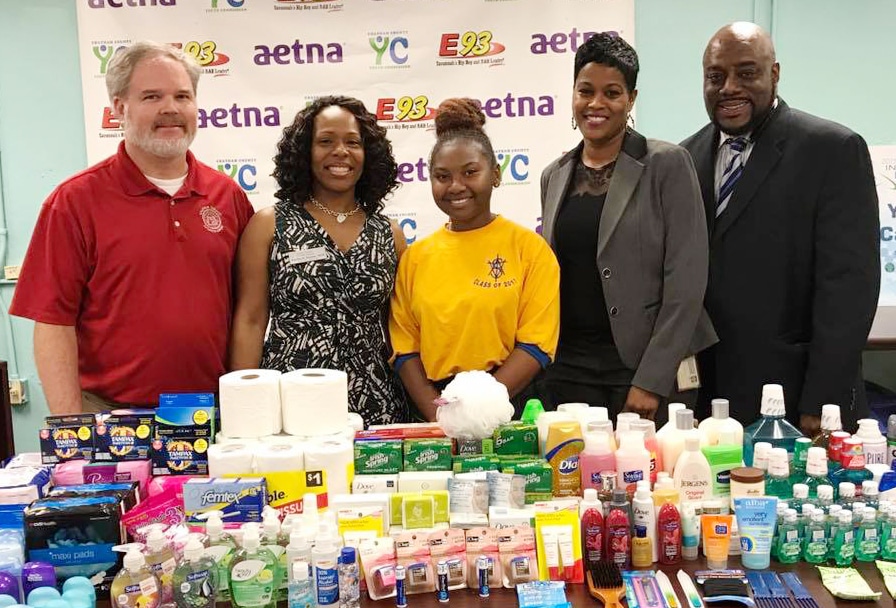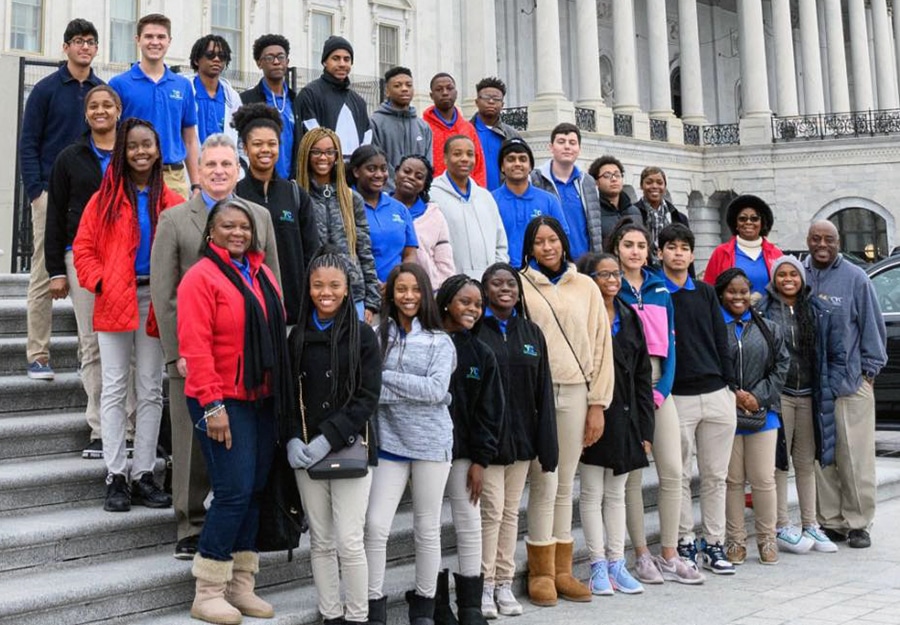Reaping the Benefits of a Youth Commission
Print This Post
Van Johnson, in front, with members of the Chatham County Youth Commission.
by Sara Baxter
Savannah Mayor Van Johnson has worked with young people and led the Chatham County Youth Commission for more than 25 years. Here he shares some advice for other communities.
They are emerging in communities large and small: youth commissions, or youth councils, which provide a way for cities to engage and empower their young people. Establishing a youth commission helps communities grow future leaders, supports the city through youth volunteer opportunities and introduces younger citizens to local government and how things work. Youth commission members gain confidence, knowledge and valuable leadership and networking skills.
One person who has dedicated his career to youth engagement is Savannah Mayor Van Johnson. Growing up in Brooklyn, New York, he considered himself an “at risk” youth and has seen firsthand the effects that positive role models and caring adults can have on the success of young people.
“My goal has always been to make sure youth don’t succumb to their environment,” says Johnson, who worked as a youth advocate at the Savannah-Chatham Youth Futures Authority, which provided support to at risk youth and families. “I believe young people do well when their family, school and community are all in sync. If one or more of those constructs aren’t in place, they don’t do as well.”
Johnson, who was an alderman before being elected mayor in 2019, has used his passion for engaging young people while serving as the director of the Chatham County Youth Commission since 1995. Chatham County Commissioner Priscilla Thomas created the commission in 1991 as a model of government and youth engagement as well as a way to embrace the diversity of the community. Made up of between 40-50 youth, the Commission consists of two members from each school in eight of the county’s municipalities. Johnson estimates that 800 young people have completed the program in Chatham County since its inception. Along the way, two “sister organizations” – in Savannah and Tybee Island – were established to involve younger students.

The Chatham County Youth Commission donated hundreds of toiletries and personal items for homeless adults and children to Chatham County Juvenile Court and Family Promise of Savannah.
“We were raising our best and our brightest and losing them,” says Johnson of why the commission was created. “They didn’t feel the need to return to Savannah after college. Now, after learning about and serving in the community, they want to come back and make the community better. We created that appetite.”
Tips for Success
With the success of the Chatham County Youth Commission, Johnson started sharing his expertise with other communities – both in Georgia and across the country. He begins by meeting with stakeholders – those that can make it happen – and helps them set up a framework. When looking to start a youth commission, Johnson offers this advice to communities:
- Start a conversation. Johnson says the first step is to have a conversation with city officials and community leaders to make sure everyone is on board. He says it’s also helpful to talk to other communities who have existing youth commissions.
- Be committed. “It’s easy to say you want a youth commission, but you have to be serious about it because creating one can be hard work,” Johnson says. He points out these efforts are more successful if the entire community is involved, which includes local organizations, city officials and other stakeholders.
- Find a champion. Whether it’s the mayor, the city commission/council or another individual, cities need someone who can see the process through from start to finish.
- Hire a dedicated staff person. Once up and running, Johnson recommends the city hire someone to oversee the commission, and preferably not a politician. “It’s easier for one person to be in charge, and dedicated so that’s all they do, and not worry about the politics,” he says.
- Commit funds to it. To help keep the program running consistently, most youth commissions have a budget that is provided by city funds. This pays for the staff member, student activities, travel and anything else that might come up.
Johnson says that one of the biggest challenges communities can face – Chatham County included – is not having enough resources to serve every young person who wants to be a part of the organization. He believes in taking a “quality over quantity” approach, and caps his program at 50 kids at a time.
“We could take 100 kids, but then I wouldn’t know their names or be able to connect as well,” he says. “That connection is important, especially when it comes to engaging youth.”

Members of the Chatham County Youth Commission with Rep. Buddy Carter on the steps of the U.S. Capitol.
Impacting the Community
Johnson believes youth commissions nurture future advocates, informed taxpayers, problem solvers and government leaders who want to return and serve the community. He takes pride in the fact that graduates of the Chatham County Youth Commission have gone on to be judges, doctors and business leaders, and some now volunteer, wanting to give back to a program that had a defining impact on them. Last year, a young man joined the program, as had his father, years ago, making it the first multi-generational team to do so.
“These organizations are the critical life blood to the viability of cities going forward,” Johnson says. “ You give young people the opportunity to grow roots. Otherwise, they go help other communities become great.”
Johnson still serves as director of the Chatham County Youth Commission. He hopes to continue as a voice for youth engagement programs as mayor, as well as for other communities as a board member of Georgia City Solutions. He calls helping youth become engaged in their communities his “passion.”
“Young people are ‘walking possibilities,’” he says. “If you educate, expose and empower them, you can expect great things from them. You need to give them opportunities to succeed. If we don’t take an active role in investing in young people, we are jeopardizing the future of our communities.”
Read part five of this 12-part series, “Taking Care of Georgia’s Youngest Citizens.”
Sara Baxter is a freelance writer based in Decatur, GA. She specializes in telling stories for nonprofit organizations.
Contact:
Kelli Bennett
GMA Communications Director
678-686-6242
gacities.com/Contact/Staff/99583
Krystin Dean
GaFCP Communications Specialist
706-897-4711
krystin@gafcp.org
Follow us on Twitter: @gafcpnews
Connect with us on Facebook.
Georgia Municipal Association anticipates and influences the forces shaping Georgia’s cities and provides leadership, tools, and services that assist municipal governments in becoming more innovative, effective and responsive.

